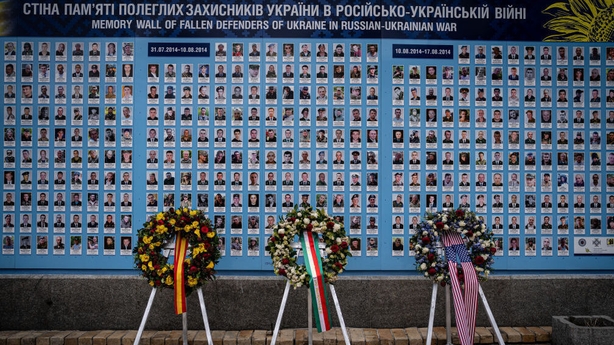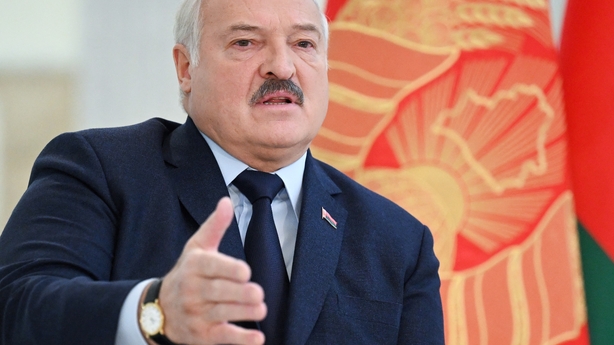New European Union sanctions over Russia's war in Ukraine target 121 individuals and entities, including Iranian drone manufacturers, according to officials.
The measures, agreed yesterday ahead of today's formal adoption, are the 10th round of EU sanctions aimed at undercutting Russia's finances and military supplies used in its invasion that started a year ago.
They echo sanctions announced by the United States and the UK, and follow up on a G7 statement that warned of penalties for any country abetting Russia in its war.
The successive round of EU measures are "the most far-reaching sanctions ever - depleting Russia's war arsenal and biting deep into its economy," European Commission President Ursula von der Leyen said.
"We are also turning up the pressure on those trying to circumvent our sanctions."
The latest measures target an additional 96 Russian entities - meaning businesses or state agencies - including another three Russian banks, according to an EU statement.
Seven Iranian entities are included this round, all manufacturers of self-exploding drones Russia has been using to strike Ukrainian targets including infrastructure and residential buildings.
An export ban on industrial goods to Russia is expanded to include dual-use items such as electronics, specialised vehicles, machine parts, spare parts for trucks and jet engines, antennae, cranes, drones, rare earth materials, electronic circuits and thermal cameras.
Trade in those goods, which battlefield evidence suggests Moscow is using for its war, amount to more than €11 billion, according to EU officials.
Sanctions on Russia's propaganda outlets were stepped up, with moves to suspend the broadcasting licences of the Arabic outlets of state-controlled media groups RT and Sputnik, which are already banned in Europe.
We need your consent to load this rte-player contentWe use rte-player to manage extra content that can set cookies on your device and collect data about your activity. Please review their details and accept them to load the content.Manage Preferences
The measures required EU member states to make more detailed reporting on assets seized from sanctioned wealthy Russians supporting the Kremlin, and frozen Russia central bank funds.
Being on the list means an asset freeze in the European Union and a visa ban.
EU High Representative for Foreign Affairs and Security Policy Josep Borrell said the latest round also targets "those responsible for the deportation and forced adoption of at least 6,000 Ukrainian children" in violation of international law.
"We will continue to increase pressure on Russia - and we will do it for as long as needed, until Ukraine is liberated from the brutal Russian aggression," he said.
Russia reportedly halts pipeline oil supplies to Poland
Meawnhile, Polish energy group PKN Orlen said that Russia had stopped supplying the group with oil through the Druzhba pipeline, which affects about 10% of Orlen's needs.
PKN Orlen Chief Executive Daniel Obajtek said the company would tap alternative sources to plug the gap.
The halt in supplies via the pipeline - which has been exempted from EU sanctions imposed on Russia following its full-scale invasion of Ukraine - came a day after Poland delivered its first Leopard tanks to Ukraine.
"We're effectively securing supplies. Russia has halted supplies to Poland, for which we are prepared. Only 10% of crude oil has been coming from Russia and we will replace it with oil from other sources," Mr Obajtek wrote on Twitter.
The company said it could fully supply its refineries via sea and that the halt in pipeline supplies would not impact deliveries of gasoline and diesel to clients.
As of February, after a contract with Russia's Rosneft expired, Orlen has been getting oil under a deal with Russia 'soil and natural gas company Tatneft.
Tatneft and Russian oil pipeline monopoly Transneft did not immediately respond to a request for comment.
US targets Russia with fresh sanctions
The United States has announced $2 billion (€1.89bn) in weaponry for Ukraine and new sanctions against Russia.
US President Joe Biden's administration outlined the sanctions as the Group of 7 bloc of wealthy nations and Ukrainian President Volodymyr Zelensky met to discuss more aid.
The steps include placing visa restrictions on Russian military members, freezing assets of allies of Russian President Vladimir Putin, effectively banning aluminum imports from Russia, curbing Russian banking and arms-making activity and putting the country's second largest mobile phone company Megafon on a trade blacklist.
Russian ambassador to the United States, Anatoly Antonov, said the sanctions would have no impact.
Additional measures could be imposed at a later date, US officials said.
The administration also sent a message to China and other countries that they should not try to help Russia evade sanctions.
"We will sanction additional actors tied to Russia's defence and technology industry, including those responsible for backfilling Russian stocks of sanctioned items or enabling Russian sanctions evasion," the White House said.
The aid to Ukraine fell short of providing the F-16 fighter jets that Kyiv has requested and some US officials are raising doubts about the ability of such measures to slow the increasing hostilities on the battlefield ahead of an anticipated springtime offensive.

Mr Antonov said the new sanctions were "thoughtless" and designed to make Russia suffer.
"Does anyone really think that this is the way to get our country to abandon its independent policies, to force it off its chosen path towards building a multipolar world based on the principle of indivisible security, on international law and the UN Charter?" a post on the embassy's Facebook page quoted him as saying.
After the G7 meeting, the leaders issued a statement on "our unwavering support for Ukraine for as long as it takes" including with more potential sanctions.
Protests
Protesters in the German and French capitals demanded peace for Ukraine, a day after activists in both countries marked one year since the Russian invasion.
Police said about 10,000 people came out in falling snow in central Berlin to call for negotiations with Moscow rather than weapons deliveries to Ukraine.
Under the slogan "Rise up for Peace", demonstrators gathered at the iconic Brandenburg Gate near where a day earlier activists had parked a bombed-out Russian tank in front of Russia's embassy in Berlin.
Organised by far-left politician Sahra Wagenknecht and feminist Alice Schwarzer, who both addressed the crowd.
"We call on the German chancellor to stop the escalation of arms deliveries. Now!...Because every day lost costs up to 1,000 more lives - and brings us closer to a 3rd world war," organisers said on their website.
The two women have also launched a petition which claims to have gathered more than 645,000 signatures.
Germany, along with the US, has been one of the biggest suppliers of weapons for Ukraine.
On Twitter, German Finance Minister Christian Lindner said: "Whoever does not stand by Ukraine is on the wrong side of history".
Meanwhile in Paris, several hundred people sang Ukraine's national anthem at Place de la Republique before Ukrainian children dressed in traditional costume led a procession.
Belarusian President Lukashenko to visit China in coming days - govt
Belarusian President Alexander Lukashenko will visit China on 28 February for a state visit, the Chinese foreign ministry has said.
Mr Lukashenko is a close ally of Russian President Vladimir Putin and has backed Moscow's invasion of Ukraine, with Belarus dependent on its neighbour both financially and politically.
"At the invitation of Chinese President Xi Jinping, President of Belarus Alexander Lukashenko will pay a state visit to China from 28 February 28 to 2 March," spokesperson Hua Chunying said.

Chinese foreign minister Qin Gang told his Belarusian counterpart Sergei Aleinik that Beijing is willing to work with Minsk to deepen mutual political trust during a phone conversation yesterday, the Chinese foreign ministry said in a statement.
China will also continue to support Belarus in maintaining its national stability, and will oppose attempts by "external forces" to interfere in its internal affairs or impose "illegal" unilateral sanctions on Minsk, Mr Qin told Mr Aleinik.

